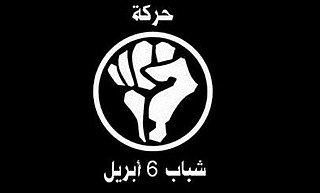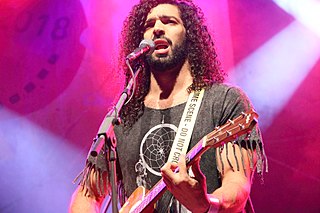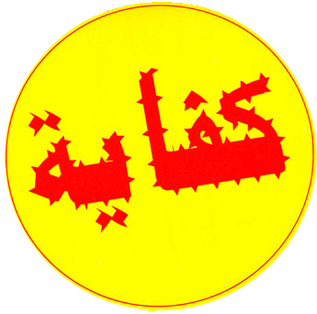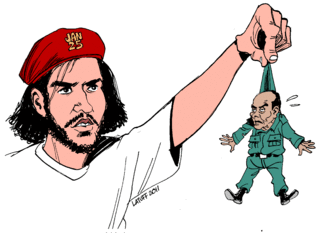 W
WThe Egyptian revolution of 2011, also known as the 25 January Revolution, started on 25 January 2011 and spread across Egypt. The date was set by various youth groups to coincide with the annual Egyptian "Police holiday" as a statement against increasing police brutality during the last few years of Mubarak's presidency. It consisted of demonstrations, marches, occupations of plazas, non-violent civil resistance, acts of civil disobedience and strikes. Millions of protesters from a range of socio-economic and religious backgrounds demanded the overthrow of Egyptian President Hosni Mubarak. Violent clashes between security forces and protesters resulted in at least 846 people killed and over 6,000 injured. Protesters retaliated by burning over 90 police stations across the country.
 W
W18 Days is an Egyptian anthology film focusing on the 18 days of the 2011 Egyptian revolution. It premiered at the 2011 Cannes Film Festival.
 W
WThere have been numerous domestic responses to the Egyptian revolution of 2011. Opposition parties, activists and religious bodies have been staunchly demanding Egyptian President Hosni Mubarak's resignation, with the exception of fearful Christian authorities, who called for staying away from the protests. The government has made ongoing attempts at media censorship, including briefly shutting down nearly all Internet traffic.
 W
WThe April 6 Youth Movement (Arabic: حركة شباب 6 أبريل) is an Egyptian activist group established in Spring 2008 to support the workers in El-Mahalla El-Kubra, an industrial town, who were planning to strike on 6 April.
 W
WThe 2012–13 Egyptian protests were part of a large scale popular uprising in Egypt against then-President Mohamed Morsi. On 22 November 2012, millions of protesters began protesting against Morsi, after his government announced a temporary constitutional declaration that in effect granted the president unlimited powers. Morsi deemed the decree necessary to protect the elected constituent assembly from a planned dissolution by judges appointed during the Mubarak era.
 W
WHuman rights in the post-Mubarak transition have been the subject of concern and controversy since the 2011 Egyptian revolution. The Supreme Council of the Armed Forces (SCAF) Arabic: المجلس الأعلى للقوات المسلحة, al-Maǧlis al-ʾAʿlā lil-Quwwāt al-Musallaḥah in particular have been the focus of concerns about human rights violations. The SCAF, which consists of a body of 20 senior officers in the Egyptian military, was handed the power to govern Egypt after the ouster of President Hosni Mubarak on 11 February 2011 as a consequence of the revolution.
 W
WRamy Essam is an Egyptian musician. He is best known for his appearances in Tahrir Square in Cairo during the Egyptian Revolution of 2011. Ramy is one of the few singers in Middle East to sing hard rock.
 W
WThe history of Egypt under Hosni Mubarak spans a period of 29 years, beginning with the 1981 assassination of President Anwar Sadat and lasting until the Egyptian revolution of January 2011, when Mubarak was overthrown in a popular uprising as part of the broader Arab Spring movement. His presidency was marked by a continuation of the policies pursued by his predecessor, including the liberalization of Egypt's economy and a commitment to the 1979 Camp David Accords. The Egyptian government under Mubarak also maintained close relations with the other member states of the Arab League, as well as the United States, Russia, India, and much of the Western World. However, international non-governmental organizations such as Amnesty International and Human Rights Watch have repeatedly criticized his administration's human rights record. Concerns raised include political censorship, police brutality, arbitrary detention, torture, and restrictions on freedoms of speech, association, and assembly.
 W
WKefaya is the unofficial moniker of the Egyptian Movement for Change, a grassroots coalition which prior to the 2011 revolution drew its support from across Egypt's political spectrum. It was a platform for protest against Hosni Mubarak's presidency and the possibility he might seek to transfer power directly to his son Gamal; political corruption and stagnation; "the blurring of the lines between power and wealth; and the regime's cruelty, coercion and disregard for human rights."
 W
WThe mass sexual assault of women in public has been documented in Egypt since 2005, when Egyptian security forces and their agents were accused of using it as a weapon against female protesters during a political demonstration in Tahrir Square, Cairo on 25 May. The behavior spread, and by 2012 sexual assault by crowds of young men was seen at protests and festivals in Egypt.
 W
WMosireen is a non-profit media activist collective that came together to document and transmit images of 2011 Egyptian revolution. Between 2011 and 2014 the group produced and published over 250 videos online, with a focus on street politics, state violence and labour rights. From 2014 onwards they worked on organising, annotating and cross-indexing what was thought to be the world's largest video collection of material from the 2011 Egyptian revolution, which was published online in January 2018 as 858: An Archive of Resistance.
 W
WThe Society of the Muslim Brothers, better known as the Muslim Brotherhood, is a transnational Sunni Islamist organization founded in Egypt by Islamic scholar and schoolteacher Hassan al-Banna in 1928. Al-Banna's teachings spread far beyond Egypt, influencing today various Islamist movements from charitable organizations to political parties—not all using the same name.
 W
WIn Egypt, the Muslim Brotherhood – a Sunni Islamist religious, political, and social movement – is, or was, considered the largest, best-organized political force in Egypt, with adherents estimated to number between 2 and 2.5 million. Founded in Egypt by Hassan al-Banna in March 1928, the group spread to other Muslim countries but has its largest, or one of its largest, organizations in Egypt, despite a succession of government crackdowns in 1948, 1954, 1965, and 2013 after plots, or alleged plots, of assassination and overthrow were uncovered.
 W
WNational Association for Change (Arabic: الجمعية الوطنية للتغيير) is a loose grouping of the various Egyptian of all political affiliations and religion, men and women, including representatives of civil society and young people aims to change Egypt. There was general agreement on the need to unite all the voices calling for change within a National Assembly. Mohamed ElBaradei is in-charge of the National Association for Change. The movement aims for general reforms in the political scene and achieving some of those procedures and guarantees necessitates the amendment of articles 76, 77, and 88 of the constitution as soon as possible. Worth mentioning is that the banned political group the Muslim Brotherhood were represented by one of their key figures who attended the meeting however their stand in accepting a non-member of their group as a candidate is yet unclear. It is also unknown whether Amr Moussa the head of the Arab League who met with Elbaradei a day earlier will be part of the new movement. The goal of the group is to bring about political reform based on democracy and social justice.
 W
WThe National Democratic Party was the ruling political party in Egypt from 1978 to 2011. The party was founded by President Anwar El Sadat in 1978.
 W
WParliamentary elections were held in Egypt held from 28 November 2011 to 11 January 2012, following the revolution that ousted President Hosni Mubarak, after which the Supreme Council of the Armed Forces (SCAF) dissolved Parliament. However the dissolution was ruled unconstitutional and Parliament was reinstated. Originally, the elections had been scheduled to be held in September 2011, but were postponed amid concerns that established parties would gain undue advantage.
 W
WKhaled Mohamed Saeed was an Egyptian man whose death in police custody in the Sidi Gaber area of Alexandria on 6 June 2010 helped incite the Egyptian Revolution of 2011. Photos of his disfigured corpse spread throughout online communities and incited outrage over allegations that he was beaten to death by Egyptian security forces. A prominent Facebook group, "We are all Khaled Said", moderated by Wael Ghonim, brought attention to his death and contributed to growing discontent in the weeks leading up to the Egyptian Revolution of 2011. In October 2011, two Egyptian police officers were found guilty of manslaughter and sentenced to seven years in prison for beating Saeed to death. They were granted a retrial and sentenced to ten years in prison on 3 March 2014.
 W
WShayfeencom is an initiative that started with three Egyptian women to help bring political reform and democracy to Egypt.
 W
WShura Council elections were held in Egypt between 29 January and 22 February 2012. The Freedom and Justice Party emerged as the largest party in the council, winning 105 of the 180 elected seats.
 W
WThe Square is a 2013 Egyptian-American documentary film by Jehane Noujaim, which depicts the ongoing Egyptian Crisis until 2013, starting with the Egyptian Revolution of 2011 at Tahrir Square. The film was nominated for the Academy Award for Best Documentary Feature at the 86th Academy Awards. It also won three Emmy Awards at the 66th Primetime Creative Arts Emmy Awards, out of four for which it was nominated.
 W
WThe Supreme Council of the Armed Forces is a statutory body of between 20 and 25 senior Egyptian military officers and is headed by Field Marshal Abdul Fatah al-Sisi and Lieutenant General Mohamed Ahmed Zaki. The council is convened only in cases of war or great internal emergencies. As a consequence of the Egyptian Revolution of 2011, SCAF assumed power to govern Egypt from departing President Hosni Mubarak on 11 February 2011, and relinquished power on 30 June 2012 upon the start of Mohamed Morsi's term as president.
 W
WTahrir 2011: The Good, the Bad and the Politician is an Egyptian documentary directed by Tamer Ezzat, Ahmad Abdalla, Ayten Amin and Amr Salama. The film is divided in three parts covering respectively the protesters, the police forces and a profile of Hosni Mubarak by several political figures. The film mixes interviews and real footage from the demonstrations. It premiered at 68th Venice International Film Festival as an out of competition feature film and the 2011 Toronto International Film Festival in the Mavericks section.
 W
WTahrir Square, also known as "Martyr Square", is a major public town square in downtown Cairo, Egypt. The square has been the location and focus for political demonstrations in Cairo, most notably those that led to the 2011 Egyptian revolution and the resignation of President Hosni Mubarak.
 W
WThe following chronological summary of major events took place during the 2011 Egyptian revolution right up to Hosni Mubarak's resignation as the fourth President of Egypt on 11 February 2011.
 W
WThe Wael Mikhael incident occurred on 9 October 2011 when two Egyptian journalists, Wael Mikhael—also known as Wael Yunna and Mikhael; also spelled Mikhail—and Mina Daniel, were killed while covering a demonstration that turned into a violent clash between the Egyptian military and Coptic protesters. Mikhael was reporting as a cameraman for the Coptic Orthodox Christian TV station in Cairo and was shot in the head while filming what was supposed to be a peaceful demonstration. Mina was reporting as a political activist blogger and was shot in the shoulder and leg.
 W
WThe al-Wasat Party, translated in English as the Center Party, is a moderate Islamist political party in Egypt.